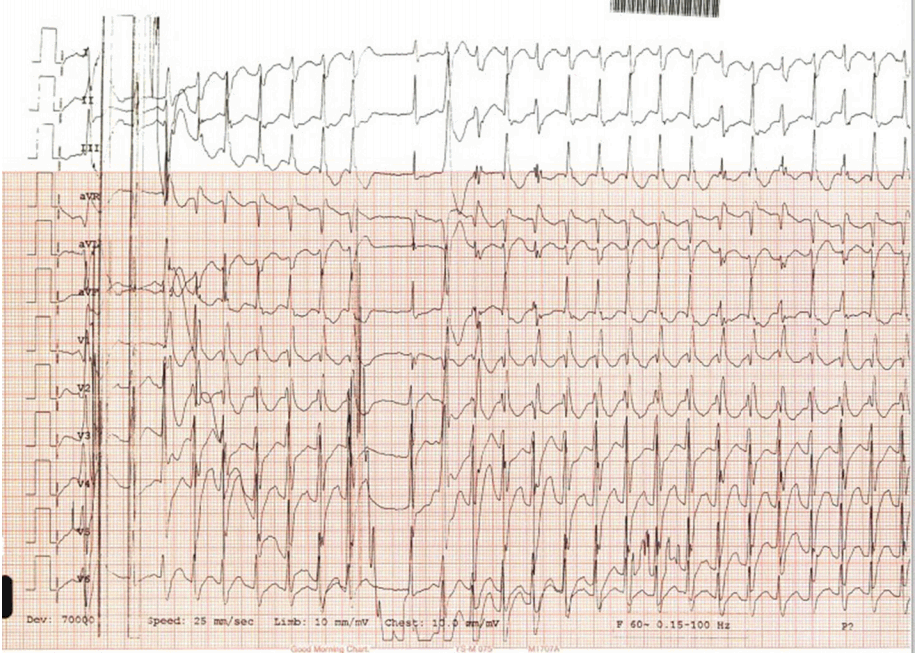Articles
- Page Path
- HOME > Acute Crit Care > Volume 32(2); 2017 > Article
- Letter to the Editor Refractory Ventricular Arrhythmia Induced by Aconite Intoxication and Its Treatment with Extracorporeal Cardiopulmonary Resuscitation
-
Mi Kyoung Hong1
 , Jeong Hoon Yang1,2
, Jeong Hoon Yang1,2 , Chi-Ryang Chung1, Jinkyeong Park1, Gee Young Suh3
, Chi-Ryang Chung1, Jinkyeong Park1, Gee Young Suh3 , Kiick Sung4, Yang Hyun Cho1,4
, Kiick Sung4, Yang Hyun Cho1,4
-
Korean Journal of Critical Care Medicine 2017;32(2):228-230.
DOI: https://doi.org/10.4266/kjccm.2017.00017
Published online: May 31, 2017
1Department of Critical Care Medicine, Sungkyunkwan University School of Medicine, Seoul, Korea
2Division of Cardiology, Department of Medicine, Samsung Medical Center, Sungkyunkwan University School of Medicine, Seoul, Korea
3Division of Pulmonary and Critical Care Medicine, Department of Medicine, Sungkyunkwan University School of Medicine, Seoul, Korea
4Department of Thoracic and Cardiovascular Surgery, Sungkyunkwan University School of Medicine, Seoul, Korea
- Yang Hyun Cho Department of Thoracic and Cardiovascular Surgery, Samsung Medical Center, Sungkyunkwan University School of Medicine, 81 Irwon-ro, Gangnam-gu, Seoul 06351, Korea Tel: +82-2-3410-6399 Fax: +82-2-2148-7088 E-mail: yanghyun.cho@samsung.com
Copyright © 2017 The Korean Society of Critical Care Medicine
This is an Open Access article distributed under the terms of the Creative Commons Attribution Non-Commercial License (http://creativecommons.org/licenses/by-nc/4.0/) which permits unrestricted non-commercial use, distribution, and reproduction in any medium, provided the original work is properly cited.
Dear Editor:


- 1. Chan TY. Aconitum alkaloid poisoning because of contamination of herbs by aconite roots. Phytother Res 2016;30:3-8.ArticlePubMed
- 2. Chan TY, Tomlinson B, Tse LK, Chan JC, Chan WW, Critchley JA. Aconitine poisoning due to Chinese herbal medicines: a review. Vet Hum Toxicol 1994;36:452-5.PubMed
- 3. Chen X, Wu R, Jin H, Gao R, Yang B, Wang Q. Successful rescue of a patient with acute aconitine poisoning complicated by polycystic renal hemorrhage. J Nippon Med Sch 2015;82:257-61.ArticlePubMed
- 4. Friese J, Gleitz J, Gutser UT, Heubach JF, Matthiesen T, Wilffert B, et al. Aconitum sp. alkaloids: the modulation of voltage-dependent Na+ channels, toxicity and antinociceptive properties. Eur J Pharmacol 1997;337:165-74.ArticlePubMed
- 5. Lin CC, Chan TY, Deng JF. Clinical features and management of herb-induced aconitine poisoning. Ann Emerg Med 2004;43:574-9.ArticlePubMed
- 6. de Lange DW, Sikma MA, Meulenbelt J. Extracoporeal membrane oxygenation in the treatment of poisoned patients. Clin Toxicol (Phila) 2013;51:385-93.ArticlePubMed
References
Figure & Data
References
Citations

- Extracorporeal cardio-pulmonary resuscitation in poisoning: A scoping review article
Mingwei Ng, Zi Yang Wong, R. Ponampalam
Resuscitation Plus.2023; 13: 100367. CrossRef - Accidental poisoning with Aconitum: Case report and review of the literature
Giuseppe Bonanno, Mariachiara Ippolito, Alessandra Moscarelli, Giovanni Misseri, Rosaria Caradonna, Giuseppe Accurso, Andrea Cortegiani, Antonino Giarratano
Clinical Case Reports.2020; 8(4): 696. CrossRef

 KSCCM
KSCCM
 PubReader
PubReader ePub Link
ePub Link Cite
Cite



